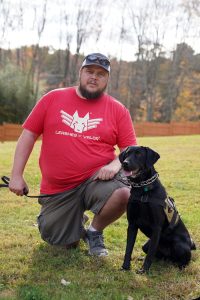I Embarrassed My Family and Let Them Down. I Knew I Needed Help.
By Chris Stanfield
Everything seemed to be closing in on me at the local parent-run soccer league that day in 2021. My young daughter was out on the field. I was the volunteer referee, taking on the role when no one else offered to step up.
But things were moving too fast. I couldn’t keep track of the rules and had trouble calling which team went out of bounds. Parents yelled their frustrations from the sidelines. One mother hurled a criticism my way.
I couldn’t keep it together any longer. I lost it and yelled at a soccer mom — an out-of-proportion reaction that had, unfortunately, become the norm in the years since I’d served in Iraq. Anger had become my default emotion. I couldn’t remember things. I was easily overwhelmed and irritable most of the time.
But my reaction during my daughter’s soccer game was a turning point. I had embarrassed my family and let them down in a very public way.
I finally decided to ask for help.
Going to War
Many of my family members were veterans but I never considered joining the military — that is until Sept. 11, 2001. Like so many of my generation, I watched the day’s events unfold in real-time on television.
I enlisted in the Army in 2005, one month after graduating from high school. By year’s end, I was in Iraq, serving in the infantry. It was, to say the least, a kinetic deployment. Rarely a week went by when my platoon didn’t get hit by small arms fire, IEDs, or sniper attacks. I saw fellow soldiers injured and civilians killed. I deployed to Iraq one more time before coming back home in 2009.
After the Army, I tried to readjust to regular life and thought that I was doing it successfully. I wasn’t. At the urging of my family, I sought help from the Department of Veterans Affairs. Like many before me, my first experience with VA was less than ideal. A failure to diagnose my PTSD by their providers and an eagerness on my part to use their failures as a scapegoat meant a decade of kicking the can down the road.
Asking for Help
In 2021, I got treatment at Home Base, a national nonprofit dedicated to healing the “invisible wounds of war” that impact as many as one in five veterans of the wars in Iraq and Afghanistan.
There, I met another veteran with a service dog and thought that could work for me, too. I was paired with my own service dog in 2022 and worked hard to successfully get back out into society. Then in 2023, my former service dog and I were in a significant car crash that led to her early retirement. Almost overnight, the progress I made started to disappear. I started to withdraw and wanted to hide away.
In 2024, I got a second chance to be partnered with a service dog, thanks to Leashes of Valor. I met the small, sweet Black Labrador named Robey on a bright fall day.

The dog was named after World War II veteran Robey Estes, who had survived D-Day and the Battle of the Bulge and had come home to run his family’s trucking business. When I learned Robey would be my new partner, it almost felt like destiny. My great-grandfather’s name was a military veteran named Robey.
Getting to know my new service dog and learning to work together for eight days at Axel’s Place was scary and overwhelming at times. I wasn’t always sure it was going to work out. But bit by bit, we began to trust each other.
By the time we graduated, Robey and I had already formed a bond that, three months later, continues to grow. I’m getting out again. I’m making plans. And I have goals.
I want to take my daughter to Disney World. I want to go on an Alaskan cruise. And I want to visit the 9/11 Memorial and Museum in New York City.
Robey has already seen me and my family through some difficult times. I know she came to me at just the right time, and I am forever grateful.
Chris Standfield is an Iraq War veteran. He received his service dog, Robey, from Leashes of Valor in November 2024.
